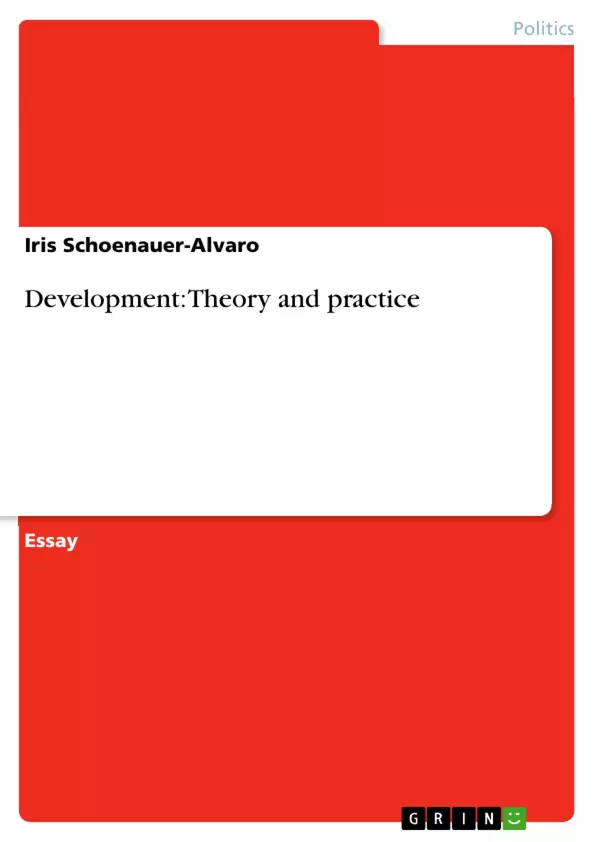The purpose of this paper is to analyse the development successes and failures of certain countries taking into account whether specific development theories have been applied successfully or not. In order to do so, I will briefly outline the tenets of the main development theories focussing on their constructive aspects without silencing the criticism held against them. Subsequently, I will discuss the different understandings of the term “development” which will be followed by country-specific analyses of development successes and failures in the light of development theory for which East Asia, Nigeria and Cuba will be used as case studies. Lastly, I will discuss whether reality really proved the predictions of development theory wrong. Generally speaking, the spirit of Peter W. Preston’s attitude expressed in his article Development Theory: Learning the Lessons and Moving On1 forges the entire essay.
Modernisation theory, the first main development theory of the post-World War II and decolonisation era, clearly reflects Cold War patterns and, as Ronaldo Munck put it, “was an expression of the then-hegemonic US imperialism” [Kirby: 1997, p. 45]. In the wake of the successful implementation of the Marshall Plan, the rest of the world should also be modernised and, by doing so, convinced to join the capitalist system. The Soviet Union, in turn, applied its “rubel diplomacy” to support several national liberation movements to get their share of the world. Unfortunately, the idiosyncrasies and special needs of development countries were not taken into consideration. Despite the fact that the modernisation ideas promoted by Durkheim, Weber, Parson, Rostow and McClelland do entail opportunities for general advancement, it is hard to imagine how they should have been compatible with societies predominantly based on a collectively oriented, rural socio-economic structure. Nevertheless, I believe that even today some aspects of this theory could be partly recycled without sacrificing the traditional societal tissue; however, the idea that development can only be guaranteed through industrialisation would need to be discarded.
Inhaltsverzeichnis (Table of Contents)
- Introduction
- Development Theories
- Modernisation Theory
- Dependency Theory
- Neo-classical Counter-revolution
- Understanding Development
- Case Studies
- East Asia
- Nigeria
- Cuba
- Conclusion
Zielsetzung und Themenschwerpunkte (Objectives and Key Themes)
This paper analyzes the successes and failures of development in various countries, exploring the effectiveness of different development theories. The main objective is to assess whether development theory accurately predicted real-world outcomes. The paper will also discuss the diverse interpretations of "development" itself.- The effectiveness of development theories in practice
- The successes and failures of development in specific countries
- The diverse interpretations of "development"
- The role of internal and external factors in development outcomes
- The impact of globalization and neo-liberal policies on development
Zusammenfassung der Kapitel (Chapter Summaries)
The first chapter provides an introduction to the topic of development theory and outlines the essay's objectives. The second chapter discusses the main development theories: modernisation theory, dependency theory, and the neo-classical counter-revolution. It explores the strengths and weaknesses of each theory, citing specific examples and criticisms. The third chapter examines different understandings of "development," considering economic growth, social indicators, and the concept of "development as freedom." The fourth chapter presents case studies of East Asia, Nigeria, and Cuba, analyzing their development trajectories in light of the theories discussed. The fifth and final chapter draws conclusions regarding the validity of development theory and its ability to predict outcomes.Schlüsselwörter (Keywords)
This paper focuses on key concepts like development theory, modernisation theory, dependency theory, neo-classical counter-revolution, economic growth, social indicators, development as freedom, globalization, and case studies.Frequently Asked Questions
What is the core idea of Modernisation Theory?
It suggests that developing countries should follow the path of Western industrialization and capitalism to achieve progress, reflecting Cold War patterns.
How does Dependency Theory differ from Modernisation?
Dependency Theory argues that underdevelopment is caused by the global capitalist system, where resources flow from poor "periphery" states to wealthy "core" states.
Which case studies are analyzed in the paper?
The paper examines development successes and failures in East Asia, Nigeria, and Cuba.
What is "development as freedom"?
It is a concept that views development not just as economic growth, but as the expansion of the real freedoms that people enjoy.
What is the Neo-classical counter-revolution?
It focuses on free markets, privatization, and deregulation as the primary drivers of economic development, often associated with neo-liberal policies.
- Quote paper
- Iris Schoenauer-Alvaro (Author), 2003, Development: Theory and practice, Munich, GRIN Verlag, https://www.grin.com/document/112831



